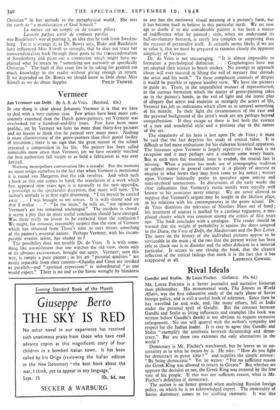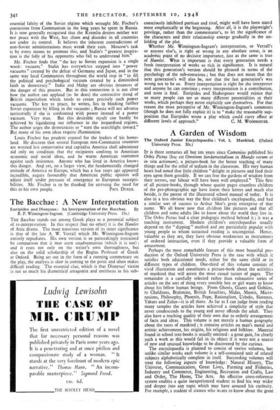Rival Ideals
Gandhi and Stalin. By Louis Fischer. (Gollancz. 10s. 6d.) MR. LOUIS FISCHER is a better journalist and narrative historian than philosopher. His monumental work, The Soviets in World Affairs, was the first exhaustive study of the early phase of Soviet foreign policy, and is still a useful book of reference. Since then he has travelled far and wide, and, like many others, fell in India under the personal spell of Gandhi. But the contrast between Gandhi and Stalin as living influences and examples (the book was written before Gandhi's death) is too obvious to require extensive enlargement. No one will quarrel with the author's sympathy and respect for the Indian leader. It is easy to agree that Gandhi and Stalin " exemplify the antithesis between dictatorship and demo- cracy." But are these two extremes the only alternatives in the world ?
Democracy is Mr. Fischer's watchword, but he leaves us in un- certainty as to what he means by it. He asks: "How do you fight for democracy in peace time ? " and supplies the simple answer: " By being democratic." Yet he writes : For no sufficient reason the Greek King was allowed to return to Greece." But whether we approve the decision or not, the Greek King was restored by the free vote of his people. If this was not sufficient reason, what is Mr. Fischer's definition of democracy.
The author is on firmer ground when analysing Russian foreign policy, on which he is an acknowledged expert. The immorality of Soviet diplomacy comes in for scathing exposure. It was this essential falsity of the Soviet regime which wrought Mr. Fischer's conversion from Communiun in the long years he spent in Russia. It is now generally recognised that the Kremlin desires neither war nor peace with the West, but chaos and disorder in all countries not under its control. It believes the inherent contradictions of non-Soviet administrations must wreak their ruin. Moscow's task is by every means to promote this, and Stalin's "greatest inspira- tion is the folly of his opponents who fail to understand him."
Mr. Fischer finds that," the key to Soviet expansion is a single word: vacuum." Stalin has everywhztre stepped into " power vacuums " created by the defeat of Germany and Japan, and in the same way local Communists throughout the world step in " to fill the political and psychological vacuum created by a diminished faith in democracy." India and Malay are obvious instances of the. danger of this process. But in this connection it is not clear how the author can applaud (as he does) the contractive trend of British imperialism which tends to create precisely such power vacuums. The key to peace, he writes, lies in blocking further Soviet expansion by filling in the vacuums ; Russia will not advance territorially if she is confronted with power instead of a power !:imeuum. Very true. But this desirable result can hardly be achieved by liquidating our influence in the jeopardised regions. The author urges the democracies to "turn the searchlight inward." But many of his own ideas require illumination.
Louis Fischer has prudent counsel for the leaders of his home- land. He discerns that several- European non-Communist countries are worried lest conservative and capitalist America shall administer aid only on condition that the recipients conform to American economic and social ideas, and he warns American statesmen against such insistence. Anyone who has lived in America knows this danger. And yet, on a larger view, the fundamentally changed attitude of America to Europe, which but a few years ago appeared incredible, augurs favourably that American public opinion will adjust itself under pressure of emergency to European suscepti- bilities. Mr. Fischer is to be thanked for stressing the need for



































 Previous page
Previous page